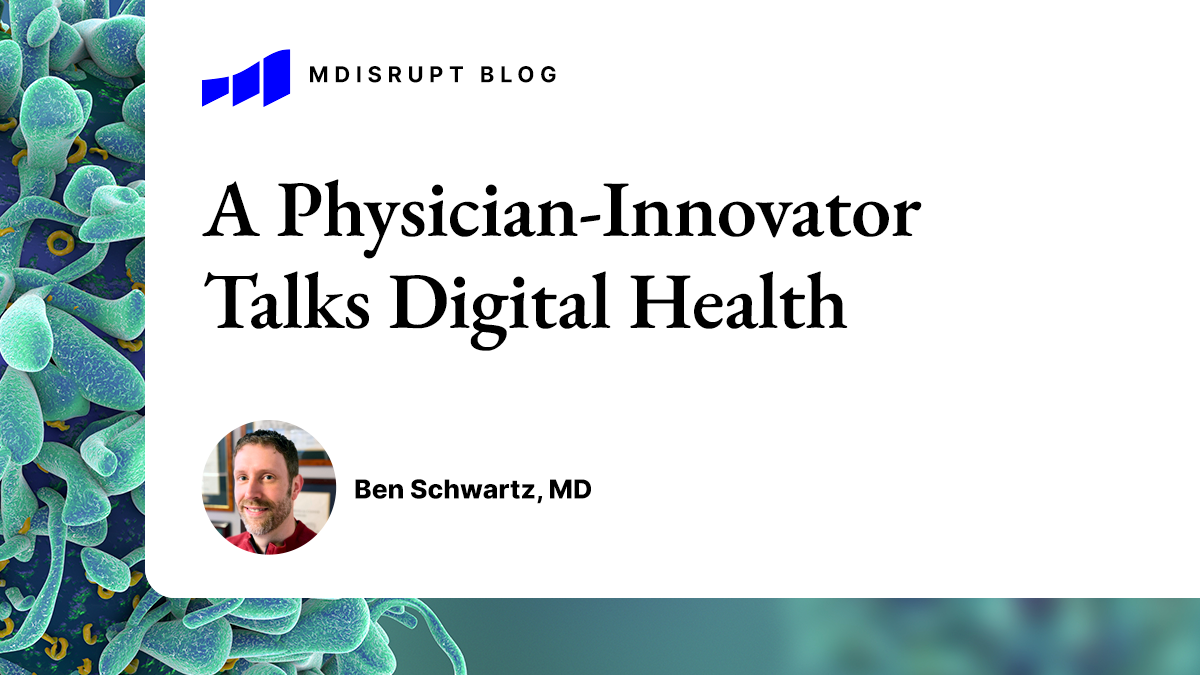
Meet Ben Schwartz, MD, an orthopedic surgeon who’s dived into digital health.
Dr. Schwartz is a board-certified orthopedic surgeon specializing in surgical and non-surgical treatment of hip and knee arthritis. He has extensive experience in digital health and serves as a chief innovation officer for Healent, an early-stage healthcare technology company. He also holds mentorship positions with incubators and accelerators, as well as advisory roles. He’s a prominent voice on LinkedIn and other social media platforms.
The Promise of Technology
MDisrupt: What got you interested in digital health?
Ben Schwartz: I had a pretty traditional practice for the first 10 years of my career. I’ve always been fascinated by computers and gadgets and new ways of doing things. About two or three years ago, I became aware of this whole world of digital health, which was maturing. We have this healthcare system that doesn’t work in a lot of ways. We have technology that works in other aspects of our lives, but we’re not really utilizing it well in healthcare. How do we adopt technology in healthcare to make things better?
MDisrupt: You’re a top voice on LinkedIn and your posts really get the conversation started. What impact do you think you’ve had?
Ben Schwartz: When I started to become interested in this, I was your traditional orthopedic private practice surgeon outside of a major metropolitan area. I didn’t necessarily come across people in digital health. LinkedIn became a great way to open doors.
MDisrupt: You wrote, “Big tech doesn’t need healthcare. Does healthcare need big tech?” What’s your answer?
Ben Schwartz: I don’t think healthcare necessarily needs big tech. We know healthcare needs to do a better job incorporating technology, because we lag behind other industries. I do think big tech has the potential to address a lot of issues in healthcare, from an access as well as a technological standpoint. You’re talking about some of the biggest, most resource-rich companies in the world and one of the biggest problems we’re facing, not just in this country, but in the entire world.
Google and Apple have shown interest in healthcare. Whether that persists I don’t know. The clinics that Apple supposedly was trying to open up were really fascinating—it’s disappointing to hear that maybe that didn’t work. Amazon is doing their typical approach of starting slowly and testing use cases and gradually building.
“Digital health tools are coming”
MDisrupt: What kind of trends are you seeing among your colleagues around innovation in healthcare?
Ben Schwartz: There are definitely pockets of physicians who are very innovation-minded. And then you have more traditional physicians who are just so busy that when they hear about technology and innovation, they roll their eyes and equate it with the EMR that’s just going to make their lives more complicated. Or they think that it’s hard to prove the use case or the value. But more and more we’re seeing physicians who are entrepreneurial who are either going to come up with their own solutions or work with companies who embrace solutions. I think that’s going to become the norm.
And if you are a physician who’s resistant to technology or innovation, now is the time to reconsider. Because artificial intelligence is coming, these health tools are coming. Patients are going to want them, health systems are going to start embracing them. The future may belong to physicians who are more innovative and entrepreneurial and embrace these things.
Consult clinicians early and often
MDisrupt: Say you were at dinner with a digital health entrepreneur, and they ask, “What do I need to consider to get my product to market?” What would you tell them?
Ben Schwartz: It’s a matter of addressing true pain points. If you don’t have experience in real-world healthcare, you may say, “Oh, I have this great product that addresses this pain point.” But if you don’t understand how healthcare is actually delivered, there are barriers you may not have considered. It’s important to make sure your solution really can be incorporated into a workflow. And how do you prove return on investment? How do you monetize it?
These are the things you want to figure out early on. A great way to do that is incorporate people who have real-world experience early on in the process. Start building your clinical team early on so you don’t get too far down the road in the wrong direction and have to start over.
MDisrupt: Bridging that gap can be pretty difficult.
Ben Schwartz: It’s a challenge. Most physicians are not on an island where they can make unilateral decisions. So how do you incorporate it into a hospital, or a health system, a physician practice, and get everybody on board? If there’s one person who puts up resistance, that can table the whole thing. There’s not an easy answer. It’s a challenge that digital health companies face and that’s why often they go to an employer or a payer, because it’s easier to make traction there.
We need physicians involved and using these products. At the end of the day, a lot of times physicians or patients are the end users, but they’re not necessarily seen as the way forward for these ideas to really gain traction and be viable.
The growing network of physician innovators
MDisrupt: Can you describe the doctor innovator phenotype?
Ben Schwartz: They are people who aren’t satisfied with the status quo. But rather than just decrying the challenges or feeling burnt out, they think, “There’s a problem, let’s figure out a way to solve it. Maybe I can design my own solution, maybe I can partner with somebody who’s developing a solution.” Those people are out there—on Twitter, on LinkedIn, at hackathons. They’re doing advisory work and they’re joining digital health companies.
MDisrupt: Is that phenotype fostered in medical school?
Ben Schwartz: The current generation of doctors in medical school are very tech savvy. They are learning about this stuff in medical school. I get so many young medical students or residents who reach out to me and say, I have an interest in this, how do I get involved? Which is great to see because that’s really going to help adoption. You’re going to have people who are innately willing to embrace this, with the medical background to guide the development of these solutions.
What’s essential to a health innovation?
MDisrupt: When you look at a new health product, how do you evaluate what’s important?
Ben Schwartz: Number one, does the health product really bring something new to the table? Does it solve a problem? Does it bring something that’s clinically relevant, clinically validated? Is it something that can be easily incorporated into a workflow, as opposed to a piece of technology that’s making things more complicated? To me, the best technology is elegant, it works in the background, or it integrates very seamlessly into what you’re already doing. And then it really makes meaningful change.
And again, unfortunately with the reality of our system, there’s got to be some eye towards return on investment and how do you make sure that this is something you can incorporate and it’s not cost-prohibitive or bring something to the table from a value standpoint.
MDisrupt: Do you see a lot of positive headlines around the pandemic having helped to bolster digital health?
Ben Schwartz: My concern is that as we—hopefully—move to a post-pandemic environment, [we examine] Did we go too far towards telehealth? I worry that there’s an overcorrection. There are certain things that telehealth or virtual solutions aren’t going to be able to address. And some patients really do want that traditional doctor-patient relationship. It doesn’t have to be for everything, and maybe healthcare technology and digital health can replace some of the inefficient, expensive things we’re doing. But at the end of the day, the doctor-patient relationship is at the core of healthcare.
Top innovative US health systems leading the way
MDisrupt: You wrote, “If you’re developing a tech-enabled healthcare solution and counting on physicians to embrace it, this issue should be front and center in your product design and go-to-market strategy.” MDisrupt is connecting innovators with clinical experts. Do you see health innovators trying to get clinical early adopters to use the technology before it’s out there?
Ben Schwartz: You have to find the individuals willing to embrace it. And there is, as far as I know, no central resource of a list of hospitals, health systems, physicians that are open to this kind of thing. And there are so many companies out there—the same people can’t be trying to adopt 50 different tools because they’re known as more forward-thinking. So I think it’s coming, I think it’s slow. I think hospitals and health systems are realizing that they have to get on board with healthcare technology and innovation. I don’t think they know exactly yet how best to do that. Some of the more innovative health systems like Stanford, Intermountain Healthcare, Cleveland Clinic, Mayo Clinic will really be the leaders on that. And then it will diffuse out to the rest of the system.
Digital tools supporting traditional healthcare
MDisrupt: What is your dream digital health tool for orthopedics?
Ben Schwartz: Orthopedics is procedure-focused. A lot of the innovation happens [around] surgical robots, or tools and equipment that we can use in the operating room. We’re seeing a shift towards value-based care. Hip and knee replacements are so commonplace and cost, particularly Medicare, a lot of money. We’re understanding that we have to do a better job of preparing patients for surgery, making sure they’re healthy enough for surgery, and making sure they understand the process of recovery. I think we are going to see educational tools like we’re trying to build with Healent. I think we’re going to see post-operative remote patient monitoring tools so that we can keep a close enough eye on patients to identify a problem and intervene earlier.
I think we will see more innovation outside the operating room in orthopedics as we see more adoption of value-based care. It’s about preparing people for treatment and also supporting them afterward. Digital health can fill that void.
MDisrupt: What does a doctor-patient relationship look like today? And what will it look like in the future?
Ben Schwartz: It gets frustrating sometimes to hear about how so-called traditional physicians are really bad at their job. If you’re outside that system, it’s easy to throw stones. But there are people on the front lines fighting these battles and doing the best they can within the system.
The doctor-patient relationship has been eroded over the last 20 years by things like EMRs, increasing administrative hoops to jump through, declining reimbursement, and increasing overhead. That doesn’t get enough attention from digital health—can we build tools to [bolster] that doctor-patient relationship? Whether it’s through documentation, natural language processing, or a better EMR, it would be great to see more of those tools come to light. Let’s build tools that really support what works about traditional healthcare, restore that doctor-patient relationship and focus on those physicians that are willing to evolve and be agents of change.
At MDisrupt we believe that the most impactful health products should make it to market quickly. We connect digital health innovators to the healthcare industry experts and scientists they need to responsibly accelerate product development, commercialization, adoption, and scale.
Our experts span the healthcare continuum and can assist with all stages of health product development: regulatory, clinical studies and evidence generation, payor strategies, commercialization, and channel strategies. If you are building a health product, talk to us.
